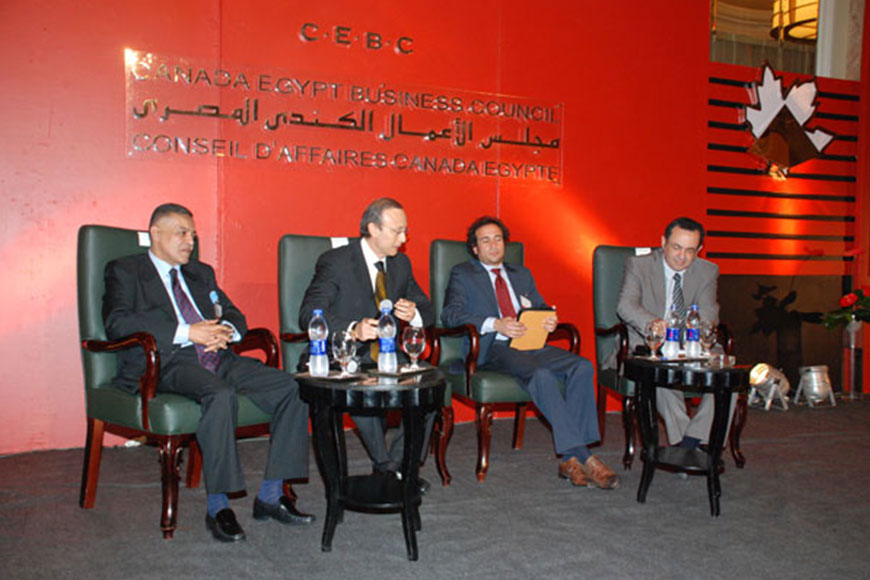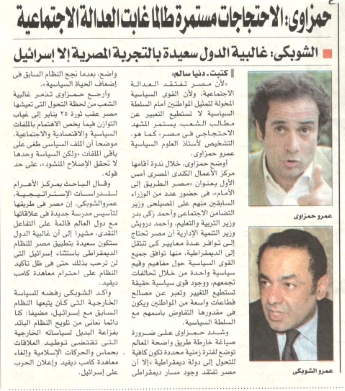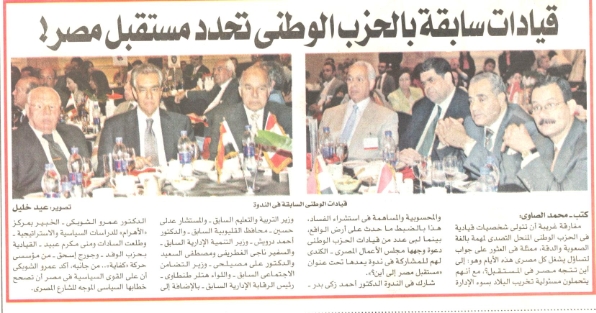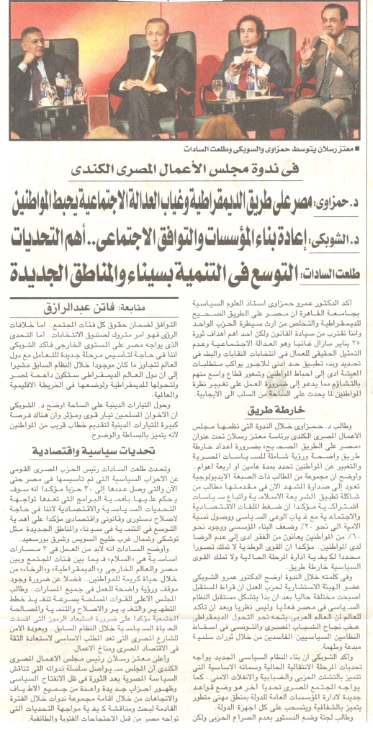
Date
Speaker(s)
Mr. Talaat El Sadat
Dr. Amr El Shobaki
Designation
Description
The Canada Egypt Business Council (CEBC) hosted a special event and panel discussion featuring Dr. Amr Hamzay, Professor of Political Science at the Cairo University, Mr. Talaat El Sadat, Chairman of the Egypt National Party and Dr. Amr El Shobaki, President of the Arab Forum for Alternatives and member of the Advisory Board of the Justice Party.
The event is the second in a series of events aiming at addressing economic and political issues pertaining to Egypt after the revolution. The event highlighted many fears and concerns with regards to the new political landscape and also shed light on what seems to be a rather vague political transformation of Egypt’s political future. The discussions attempted to answer questions about whether Egypt is on the right track towards democracy valiantly fought for in the 25th of January revolution.
Over 250 prominent attendees attended the event from CEBC members and guests ambassadors and ministers among whom were H.E. Dr. Ashraf Hatem, the Minister of Health, and former ministers H.E. Dr. Ibrahim Fawzy, H.E. Mostafa El Saiid, H.E. Dr. Ali-Moselhy, H.E. Dr. Hany Helal, H.E. Dr. Ahmad Zaki Badr and other prominent figures from the political and the business sectors.
CEBC Chairman, Mr. Motaz Raslan, delivered the opening remarks by outlining the drastic changes the Egyptian political landscape is witnessing since the January 25th revolution, pinpointing that in previous sessions there was a consensus among the prominent speakers that it was a rather difficult task to predict the future of the turbulent political journey Egypt is taking. A month had passed since then, during which many changes have taken place, giving room for further questioning of the current status and where it is leading to. Describing the political unrest and rapid change in the Egyptian political landscape, Raslan said, “Egypt is a nation in labor”. He highlighted that at the moment there are 30 political parties competing on the political arena. He concluded his remarks by saying that “as time passes by, I am certain that these factions will fall into groups of similar thought,” he said.
Mr. Raslan then left the floor to the first guest speaker Dr. Amr El Shobaki, who commenced his speech by drawing the attendees’ attention to the fact that for the first time in the Egyptian history the prospect of a true democratic transformation is discussed as a practical viable goal. “We are no longer discussing that issue from a theoretical point of view and in a spirit of wishful thinking as we used to do” he commented shedding light on the positive reality that claims of Egyptians being unfit for democracy or Egypt not ready for democracy have been refuted practically.
Answering the question on Egypt’s path toward democracy, Dr. El Shobaki compared what Egypt is going through with past democratic experiences in other countries. In this regard, he sees that an indication to Egypt being on a tangible track toward democracy is the fall of the icons of the former corrupt regime, but not the state or its institutions. He added that the process of getting rid of the remnants of the old regime without demolishing the state’s institutions is a positive sign. He gave more examples of positive resemblance to successful democratic transformations saying that political disunity and confusion, lack of security and resistance from the former regime are all inherent in any transitional period. He then clarified that this taking place in parallel with reformation of governmental institutions, without any random revenge taking through exceptional courts are the right steps towards a democracy. “We need to rejuvenate political landscape and allow different and new political powers to step in and this already started to happen,” said El Shobaki.
El Shobaki resumed to append the current turbulent scene’s roots to the severely vicious corruption that dominated most state institutions. He mentioned that radical reformation of these institutions was vital adding that former institutions and those in charge of them need to be taken to justice through the regular channels.
Addressing the issue of the alarming lack of consensus among political powers, El Shobaki stressed on the importance of differentiating between major consensuses and acceptable political differences. “There are principles that need to be agreed upon among all factions and that surpass parties and ideologies such as the civility of the state and the constitution, democratic republic being the chosen form of government, national solidarity and similar principles.” El Shobaki explained that agreeing upon issues similar to those are major consensuses that are mandatory for moving ahead toward a democratic transformation. He then added that a constitution is never the result of political struggle; however it is by default the fruit of consensus among different political factions upon a set of superior rules.
In termination of his word, he spoke of Egypt’s external challenges confirming that the democratic world will support the Egyptian political transformation. “We need to establish new policies in regards to our diplomatic relationships with other countries, avoiding the old dual alliances that were quite confining and controlling”, he said. He abhorred old Egyptian stands on the Palestinian cause and called for taking a balanced stance that is objective and peaceful.
The floor was assumed next by Dr. Amr Hamzawy who started off by setting clear criteria for assessing the path Egypt is on at the current time, highlighting points such as how the revolution’s original demands are being met. In his point of view, the manner in which these original demands are being met is quintessentially positive. He defined the demands to be rather universal; demands such as justice, human dignity, democracy while there were not any ideological demands. “Thus the consensus of which my colleague speaks has already been reached spontaneously during the revolution. Now, the true ideological differences are surfacing,” commented Hamzawy. Going back to whether or not these demands are being met, Hamzay confirmed that through getting rid of the remnants of the past regime and its single party system lawfully and democratically and reforming all state institutions, Egypt is on a track towards meeting these demands. “In only three months, Egypt was able to take positive steps on many fronts; something many other nations were unable to do under similar circumstances”.
Nonetheless, in regards to the steps taken towards eradicating severe social injustice, Hamzawy sees that it is currently unsuccessful explaining that in the wake of the current circumstances a system that allows people to communicate their aspirations freely and efficiently is absent adding that neither political factions nor other civil society entities are able to perform that role at the moment.
The second criterion Hamzawy set was Egypt’s success in managing the post-revolution events in comparison to other democratic experiences. On this issue, Hamzawy pointed out that for a transitional period to end successfully, there has to be a consensus reached, which as he sees is absent. “We may all agree upon democracy, civility of state, however I doubt that all factions interpret these terms the same way”. He highlighted that a road map that is agreed upon for a period of time long enough for a true democratic transformation, that is to say 2 to 4 years, not merely 6 months, does not exist explaining that today’s political powers are unable to represent the people or translate their will into tangible policies.
Dwelling on other criteria, Hamzawy stated that guarantees for equality and citizenship are currently being negotiated among different factions. Some factions are seeking these guarantees, while others are looking to diminish them.
Finally, he underscored the fact that the overall sentiment of the people is dissatisfaction with the democratic process, he attributed that to the economic challenges the country is going through at the moment. Hamzay then concluded his speech by stressing on the importance of regaining economic and security balance, “The people will then regain their optimism and trust and will be able to positively see the political transformation taking place”, concluded Hamzawy.
Hamzawy left the floor to the third and final speaker, Mr. Talaat El Sadat who prorogued his word saying that the January 25th revolution was “beyond our wildest dreams for Egypt”. He then introduced five paths towards democratic political transformation that should be taken simultaneously: purification, change, reformation, development and reconciliation.
On purification, El Sadat stressed that some figures have destroyed the past political life, however, that does not mean that any contributor to the old regime is necessarily corrupt. He added that many high ranking officials and ministers assumed posts in the old regime, yet had a clean record and did not abuse the power assigned to them in any way. “The trials going on at the moment are lawful and just. Nonetheless, as this goes on, the media should not slander the figures in question and spread outrageous rumors about them. I, personally, have suffered from such unethical practices and can testify to its ferocity”, commented El Sadat.
Shedding light on the government, El Sadat observed that young elements who started the revolution in the first place are completely absent from today’s decision-making process. Thus, he encouraged for such new blood to be included as steps in the reformation and change paths. Testifying to lack of reformation was the final ministerial replacement, El Sadat said, criticizing harshly that a single woman currently resides in the cabinet.
At the end of his word, El Sadat spoke of human dignity being a key element in the well being of all Egyptians saying that Egyptians need to reconcile with the untainted figures that had a presence in the old regime. El Sadat also said that religious tolerance is of utmost importance, as part of the reconciliation process.
The floor was then opened to questions from the audience. The esteemed attendees asked questions concerning foreign investments, fear of deviation from seeking democracy at the request of the majority as a result of lack of education, in addition to questions covering issues related to the future of the Egyptian economy, security and religious strife.
The event included much needed explanation and clarification of the current situation in Egypt. In addition, it answered many questions the attendees had on the future of Egypt. The speakers were able to discuss the status from various angles and from different points of view offering the attendees a comprehensive analysis of Egypt’s political landscape.


























